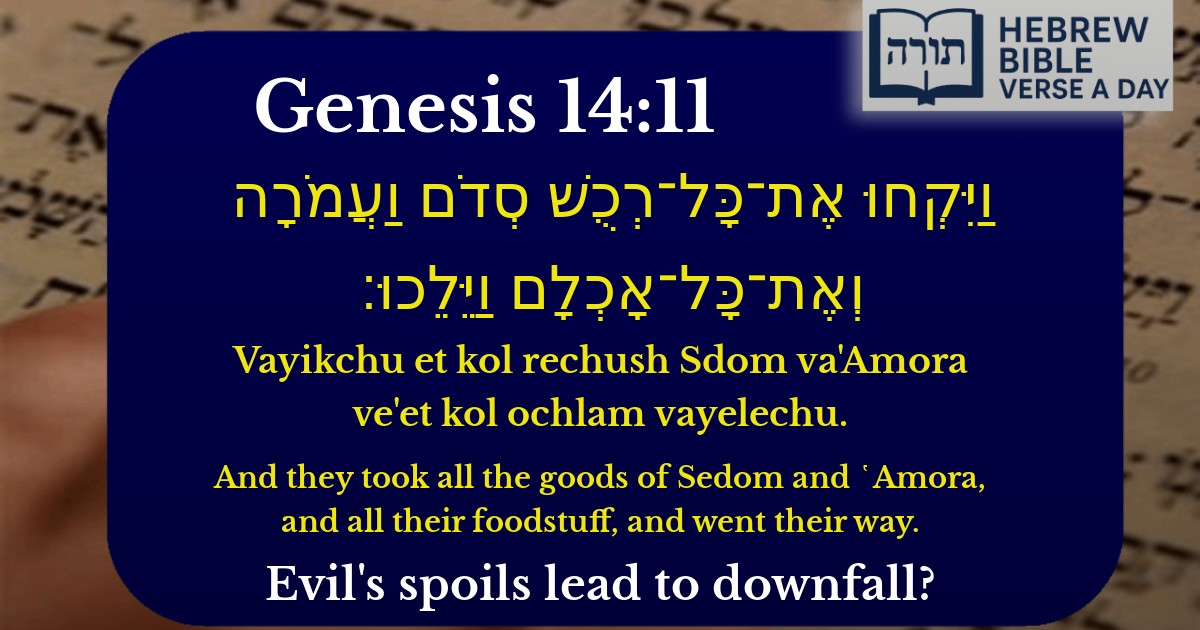Frequently Asked Questions
Q: What does Genesis 14:11 mean when it says they took 'all the goods of Sedom and Amora'?
A: This verse describes how the four kings, led by Kedorlaomer, conquered Sedom and Amora and took all their possessions and food. According to Rashi, this was part of the punishment for the wickedness of these cities, as their wealth had made them arrogant and cruel (Rashi on Genesis 13:13). The verse highlights how material wealth can be fleeting when people act unjustly.
Q: Why is the conquest of Sedom and Amora mentioned in the Torah?
A: The conquest is mentioned to set the stage for Avraham's heroic rescue of his nephew Lot later in the chapter (Genesis 14:14-16). The Midrash teaches that this event demonstrated Avraham's kindness and bravery in contrast to the wickedness of Sedom (Bereishit Rabbah 42:8). It also shows how Hashem allows events to unfold to ultimately fulfill His plans.
Q: What lesson can we learn from Genesis 14:11 about wealth and possessions?
A: The verse teaches that wealth gained through wickedness (like that of Sedom) is temporary and can be lost suddenly. The Rambam teaches that true wealth comes from righteousness and trusting in Hashem (Hilchot De'ot 5:10). This aligns with the Torah's warning that material success without moral foundations is unstable.
Q: How does the phrase 'and all their foodstuff' add meaning to the verse?
A: The mention of food being taken shows the completeness of the conquest - even basic necessities were seized. The Talmud (Sanhedrin 109a) explains that the people of Sedom were particularly cruel about food, refusing to share with strangers, so their food being taken was measure-for-measure justice. This teaches about the importance of hospitality and sharing resources.
Q: Why does the Torah specify that they 'went their way' at the end of the verse?
A: Rashi explains that this phrase emphasizes how the conquering kings left nothing behind - they completely stripped the cities (Rashi on Genesis 14:11). On a deeper level, the Sforno notes that this shows how the conquerors felt no responsibility toward the people they defeated - they simply took what they wanted and moved on, reflecting their own moral shortcomings.


Context in the Narrative
This verse (Bereshit 14:11) describes the aftermath of the war between the four kings and the five kings, where the victorious forces plundered Sodom and Gomorrah. The capture of all their possessions and food highlights the complete devastation wrought upon these cities even before their ultimate destruction.
Rashi's Commentary
Rashi explains that the phrase "וַיִּקְחוּ אֶת־כָּל־רְכֻשׁ סְדֹם" ("they took all the goods of Sodom") refers not only to material wealth but also to the people themselves, as Lot and his household were taken captive (as mentioned in the following verses). This aligns with the broader context of the narrative, where human lives were treated as mere property by the invading kings.
Midrashic Insights
Rambam's Perspective
In Moreh Nevuchim (Guide for the Perplexed 3:50), Rambam discusses how Sodom's societal sins—especially their hostility toward strangers and their obsession with wealth—led to their downfall. The loss of their possessions in this verse serves as a precursor to their complete annihilation, illustrating the principle that material corruption leads to destruction.
Halachic Implications
The Talmud (Sanhedrin 109a) derives from this episode that the people of Sodom were judged not only for sexual immorality but also for systemic cruelty, including their laws against assisting the needy. The plundering of their food ("אָכְלָם") underscores how their refusal to share resources resulted in their own deprivation.